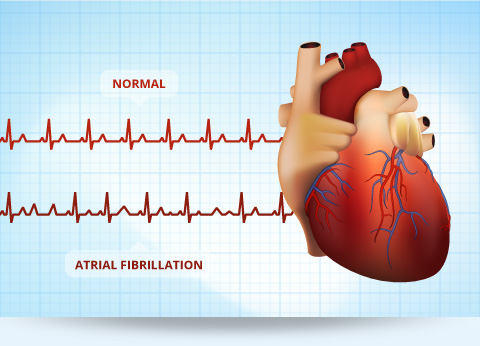- Home
- Editorial
- News
- Practice Guidelines
- Anesthesiology Guidelines
- Cancer Guidelines
- Cardiac Sciences Guidelines
- Critical Care Guidelines
- Dentistry Guidelines
- Dermatology Guidelines
- Diabetes and Endo Guidelines
- Diagnostics Guidelines
- ENT Guidelines
- Featured Practice Guidelines
- Gastroenterology Guidelines
- Geriatrics Guidelines
- Medicine Guidelines
- Nephrology Guidelines
- Neurosciences Guidelines
- Obs and Gynae Guidelines
- Ophthalmology Guidelines
- Orthopaedics Guidelines
- Paediatrics Guidelines
- Psychiatry Guidelines
- Pulmonology Guidelines
- Radiology Guidelines
- Surgery Guidelines
- Urology Guidelines
Catheter ablation improves outcomes in atrial fibrillation and heart failure patients, finds study

Catheter ablation may improve outcomes in patients with atrial fibrillation and heart failure revealed a study published in the European Heart Journal. The study compared the efficacy of different rhythm control strategies in patients with atrial fibrillation and heart failure.
Atrial fibrillation and heart failure management remain a challenge for cardiologists. Prior studies have proposed enhanced outcomes after catheter ablation as compared to conventional drug therapy alone in patients with heart failure (HF) and atrial fibrillation (AF).
Read Also: Catheter ablation superior to drug therapy in atrial fibrillation and heart failure
A team of scientists at the Frankfurt Academy For Arrhythmias sought to evaluate the efficacy and safety of rhythm control strategy in patients with AF complicated with HF regarding hard clinical endpoints. Up-to-date randomized data comparing rhythm control using antiarrhythmic drugs (AADs) vs. rate control (Subset A) or rhythm control using catheter ablation vs. medical therapy (Subset B) in AF and HF patients were pooled.
The primary outcomes were all-cause mortality, re-hospitalization, stroke, and thromboembolic events. A total of 11 studies involving 3598 patients were enrolled.
As compared with medical rate control, the AADs rhythm control was associated with similar all-cause mortality, A significantly higher rate of re-hospitalization, and a similar rate of stroke and thromboembolic events
As compared with medical therapy, catheter ablation rhythm control was associated with significantly lower all-cause mortality, reduced re-hospitalization rate, a similar rate of stroke events, greater improvement in left ventricular ejection fraction, lower arrhythmia recurrence, and greater improvement in the quality of life.
Based on the results the authors concluded that " Catheter ablation as rhythm control strategy substantially improves survival rate, reduces re-hospitalization, increases the maintenance rate of sinus rhythm, contributes to preserving cardiac function, and improves quality of life for AF patients complicated with HF."
For further reference, click on the link

Disclaimer: This site is primarily intended for healthcare professionals. Any content/information on this website does not replace the advice of medical and/or health professionals and should not be construed as medical/diagnostic advice/endorsement or prescription. Use of this site is subject to our terms of use, privacy policy, advertisement policy. © 2020 Minerva Medical Treatment Pvt Ltd